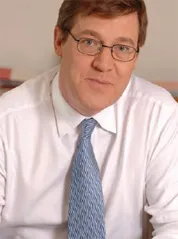Christopher Baker '83, A Global Career: From Paris to Kazakhstan and Beyond

Just six years after he graduated from the Law School, Christopher Baker, ’83, founded the Paris office of Skadden, Arps, Slate, Meagher & Flom. He led that office for more than 20 years and is still there today, specializing in what he describes as “doing legally and culturally complicated deals.”
He was well qualified for the responsibilities of founding that office, having grown up in Paris, being fluent in French, English, German, and Russian, and holding an LLM from NYU in addition to his Chicago JD. As an associate at Coudert Brothers before he joined Skadden, he was closely involved in helping Coudert become the first foreign firm to open an office in Russia. Founding legal enterprises might run in his DNA—his grandfather was the original “Baker” in Baker & McKenzie, and his father founded that firm’s Paris office.
Although he is based in Paris and has handled high-profile assignments in France that include the privatization of Air France, the acquisition of Yves Saint-Laurent by Gucci, and advising the French Ministry of Finance, Baker’s practice has also always brought him to faraway nations. Soon after helping to establish Skadden’s Moscow practice in 1991, he became involved with Kazakhstan, a country he came to love for its vibrant and hospitable people, its majestic landscapes, its centuries-old traditions—and its fascinating need for new laws and legal institutions. Among other things, he negotiated Kazakhstan’s tax treaties after it became an independent nation, a process that involved high-level meetings from Ankara to Washington, DC, via Rome, London, and Paris;, and then he facilitated the drafting of Kazakhstan’s tax code, which required him to induce collaboration between seven powerful multilateral agencies, including the World Bank and the International Monetary Fund. Under his guidance, Kazakhstan became the first of the former Soviet Union countries to enact a full tax code.
Now his work is reaching into China and Africa: recent assignments have included the sale of a large private Kazakh oil company to a joint venture controlled by the Kazakh state oil company and the Chinese state oil company, the acquisition of French industrial sites for Chinese clients, and the purchase by an international joint venture of Shell’s entire fuel and lubricant distribution business in Africa.
On the bookshelf behind the desk in his office overlooking the Eiffel Tower, Baker has his materials from the Elements of Law course he took with Edward Levi. He has used them to design courses he teaches at the law school of the Institut d’Études Politiques de Paris (the Paris Institute of Political Studies), where France’s political and diplomatic elite have traditionally been prepared for public life. He has taught US law there for six years, and three years ago he also began teaching a course, “Compliance and Social Innovation,” exploring developments in corporate social responsibility and related themes in legal ethics—a field toward which his professional practice has increasingly led him.
“Ed Levi modeled what to me was the best of my Chicago Law School education,” Baker says. “Both facts and ideas are to be handled with respect—but critically. I learned to ask what I have found to be a very valuable question—‘Are we really sure about that?’—as a probe to understand key facts better and as a way to shake a new idea loose from its roots. I learned at Chicago—and it has been integral to my entire practice—that when ideas are permitted to breed, they will, and that results in more ideas, sometimes new and better ideas. Likewise, digging will sometimes produce new and better facts. I’ve built not just a practice but a way of approaching life—and teaching—around making ideas intermingle and making facts speak. I have found the process to be wonderfully nonlinear and key to true disciplined thought and intellectual rigor.”
One place where Baker works on mingling ideas these days is at the École des Hautes Études en Sciences Sociales (School for Advanced Studies in the Social Sciences), a leading French research institute. After providing pro bono assistance to the school in establishing its endowment fund, Baker has worked alongside the faculty to promote, through a series of seminars and breakfast meetings, a continuing exchange of ideas at the interface between social science research and the practical work of French business and political leaders.
He’s not finished with founding things, either. He was one of the instigators of last year’s launch of the first law clinic in France, at the law school of the Paris Institute of Political Studies, and he is one of the key leaders behind the establishment of France’s newest law school, the independent, privately funded École des Hautes Études Appliquées du Droit (School of Advanced Studies of Applied Law), which offered its first classes last month.


